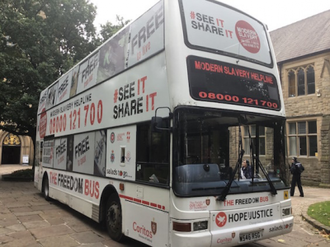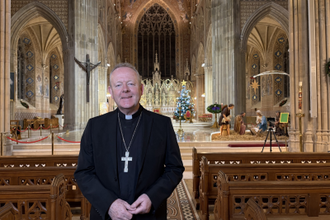Caritas Salford marks Anti-Slavery Day

Caritas Salford Anti-Slavery Bus
Source: Caritas Salford
Sunday 18 October is Anti-Slavery Day, which was first marked back in 2010 as a result of a Private Members Bill - the Anti-Slavery Day Act. It provides a much needed opportunity to remind everyone - government, local authorities, organisations, communities, families and individuals - that we all have a responsibility to look for and then slot together the separate pieces of the jigsaw, to form a complete picture of human trafficking and slavery, which is happening in plain sight in every town in every country across the world today.
Pope Francis, within the first few paragraphs of his newly published encyclical 'Fratelli Tutti', informs us that "millions of people today…are deprived of freedom and forced to live in conditions akin to slavery" #24. With over 27 million people currently in slavery worldwide, it is easy to feel overwhelmed by the sheer scale of the problem. All "persons of goodwill", to whom the Holy Father addresses his encyclical, will share concern and a sense of responsibility for the situation but many will be uncertain about how they personally can make a difference. Certainly, lockdown restrictions and social distancing measures due to the pandemic have made spotting and reporting the signs of trafficking and modern slavery even more challenging than usual.
Caritas Salford, together with the Diocese of Salford, have made great strides in addressing this issue across their communities and networks, starting with their own internal processes. Mark Wiggin, Director of Caritas Salford, gives us an insight here to how they have gone about it: "Our plans are ambitious with an overall aim to free our Diocese of modern day slavery by 2025. To help us achieve this, we have adopted a policy of Spot, Respond and Support across the Diocese and Caritas's services, and are ensuring that staff at all levels and volunteers are trained in how to recognise the signs of human trafficking and slavery, how to report what they have observed and support the victims in overcoming their trauma as appropriate and in line with our Safeguarding Policy. This is fundamental to our commitment to combatting human trafficking and until we reach that point, to improving outcomes for the victims."
Developing partnerships and working collaboratively is considered essential. A Modern Slavery Good Practice Auditing Tool has been created and implemented jointly by Caritas Diocese of Salford, the Greater Manchester Anti-Slavery Network, Police, statutory and non-statutory agencies, charities, faith groups and businesses. The purpose of the auditing tool, which Caritas will be piloting shortly, is to assist organisations working with homeless and vulnerable people to assess how well they are progressing towards identifying and safeguarding victims of Human Trafficking and Modern Slavery. Where appropriate, they signpost and refer victims to partner agencies who can assist with ongoing support and protection. As Pope Francis says, "We need to ensure that our institutions are truly effective in the struggle against all these scourges." 'Fratelli Tutti' #188.
In addition to the auditing tool, the Diocese of Salford has begun the process of developing a Modern Day Slavery Statement to reflect good practice and offer a model, alongside Westminster and other dioceses, to develop measures to combat modern day slavery in supply chains.
Our schools also have a key role to play, especially in recognising which young people are potentially vulnerable to being recruited into County Lines drug operations. An angry, excluded pupil with no sense of danger and time on their hands makes for a perfect County Lines drug mule candidate.
We too as private individuals must work to positively influence the ambitious target of 2025 set by Caritas and the Diocese of Salford by being observant and noticing the behaviour and demeanour of those around us and reporting it when our gut feeling tells us that something isn't right. Caritas Anti-Trafficking is a response to Pope Francis's call for Catholics and law enforcement officers around the world to join together in the fight against human trafficking and modern-day slavery. Human trafficking happens here, "hidden in plain sight", and we all have a duty to be aware and report what we see. Moreover, we are all complicit in the poverty and exploitation that fuels human trafficking as Pope Francis tells us in 'Laudato Si': "In the absence of objective truths or sound principles other than the satisfaction of our own desires and immediate needs, what limits can be placed on human trafficking, organised crime, the drug trade …" #123.
Caritas Anti-Trafficking was inspired by an initiative in the parish of Our Lady of the Valley in Salford Diocese, which works with East Lancashire Police in raising awareness and informing people what to do when they see something that doesn't look right and probably isn't. Taking the lead from this parish model, it links more widely with Greater Manchester Police, the Medaille Trust and the Santa Marta Group in Westminster. It networks with charities and groups interested in tackling modern day slavery and raises awareness within parishes, schools and groups, also offering advice, signposting and pastoral support to victims of human trafficking.
For further information please contact: ModernSlavery@caritassalford.org.uk


















